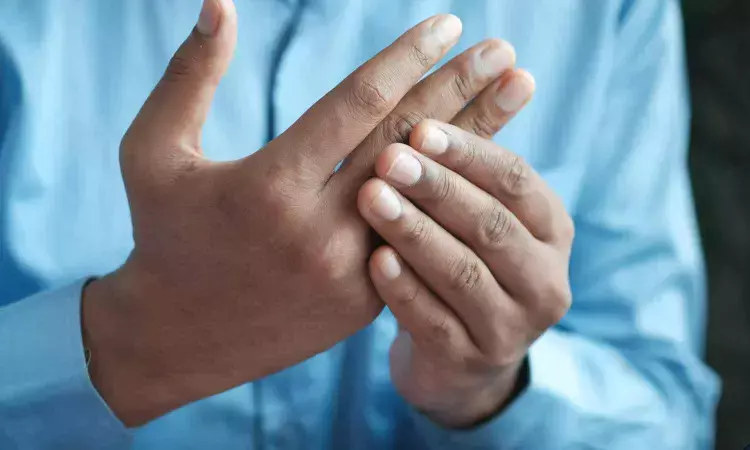- Home
- Medical news & Guidelines
- Anesthesiology
- Cardiology and CTVS
- Critical Care
- Dentistry
- Dermatology
- Diabetes and Endocrinology
- ENT
- Gastroenterology
- Medicine
- Nephrology
- Neurology
- Obstretics-Gynaecology
- Oncology
- Ophthalmology
- Orthopaedics
- Pediatrics-Neonatology
- Psychiatry
- Pulmonology
- Radiology
- Surgery
- Urology
- Laboratory Medicine
- Diet
- Nursing
- Paramedical
- Physiotherapy
- Health news
- Fact Check
- Bone Health Fact Check
- Brain Health Fact Check
- Cancer Related Fact Check
- Child Care Fact Check
- Dental and oral health fact check
- Diabetes and metabolic health fact check
- Diet and Nutrition Fact Check
- Eye and ENT Care Fact Check
- Fitness fact check
- Gut health fact check
- Heart health fact check
- Kidney health fact check
- Medical education fact check
- Men's health fact check
- Respiratory fact check
- Skin and hair care fact check
- Vaccine and Immunization fact check
- Women's health fact check
- AYUSH
- State News
- Andaman and Nicobar Islands
- Andhra Pradesh
- Arunachal Pradesh
- Assam
- Bihar
- Chandigarh
- Chattisgarh
- Dadra and Nagar Haveli
- Daman and Diu
- Delhi
- Goa
- Gujarat
- Haryana
- Himachal Pradesh
- Jammu & Kashmir
- Jharkhand
- Karnataka
- Kerala
- Ladakh
- Lakshadweep
- Madhya Pradesh
- Maharashtra
- Manipur
- Meghalaya
- Mizoram
- Nagaland
- Odisha
- Puducherry
- Punjab
- Rajasthan
- Sikkim
- Tamil Nadu
- Telangana
- Tripura
- Uttar Pradesh
- Uttrakhand
- West Bengal
- Medical Education
- Industry
Faster Weight Loss on Anti-Obesity Medication Correlated With Lower Risk of Gout, finds research

Faster Weight Loss on Anti-Obesity Medication Correlated With Lower Risk of Gout suggests a new study published in the Arthritis Rheumatology.
Weight loss is conditionally recommended for gout management; however, its impact on incident gout and recurrent gout flares among overweight and obese individuals remains unknown. We aimed to investigate the relationship between weight loss rate following the initiation of anti-obesity medications and the risk of incident gout and recurrent gout flares among overweight/obese individuals.
Using data from The Health Improvement Network, we selected individuals aged 18 and older who were overweight or obese and started anti-obesity medication. We emulated a target trial to examine the association of different weight loss rates, slow (2-5%), moderate (5-10%), or fast (≥10%), within the first year of treatment with incident gout and recurrent gout flares during a 5-year follow-up period. Results: Among 131,000 participants without gout starting orlistat, the 5-year risk of incident gout was 1.6% for those with weight gain/stable, compared with 1.5%, 1.3%, and 1.2% for those with slow, moderate, and fast weight loss, respectively.
Compared with the weight gain/stable arm, the hazard ratios were 0.91 (95% confidence interval [CI]: 0.81 to 1.01), 0.82 (95%CI: 0.72 to 0.92), and 0.73 (95%CI: 0.62 to 0.86) for slow, moderate and fast rate of weight loss arms, respectively. Similar results were observed for the recurrent gout flares among 3,847 overweight or obese individuals with gout starting orlistat. A higher rate of weight loss after initiating orlistat within 1-year was associated with lower risks of incident gout and lower rates of recurrent gout flares among overweight or obese people.
Reference:
Wei J, Wang Y, Dalbeth N, et al. Weight loss after initiating anti-obesity medications and gout among overweight and obesity individuals: a population-based cohort study. Arthritis Rheumatol. Published online September 19, 2024. doi.org/10.1002/art.42996
Dr. Shravani Dali has completed her BDS from Pravara institute of medical sciences, loni. Following which she extensively worked in the healthcare sector for 2+ years. She has been actively involved in writing blogs in field of health and wellness. Currently she is pursuing her Masters of public health-health administration from Tata institute of social sciences. She can be contacted at editorial@medicaldialogues.in.
Dr Kamal Kant Kohli-MBBS, DTCD- a chest specialist with more than 30 years of practice and a flair for writing clinical articles, Dr Kamal Kant Kohli joined Medical Dialogues as a Chief Editor of Medical News. Besides writing articles, as an editor, he proofreads and verifies all the medical content published on Medical Dialogues including those coming from journals, studies,medical conferences,guidelines etc. Email: drkohli@medicaldialogues.in. Contact no. 011-43720751


